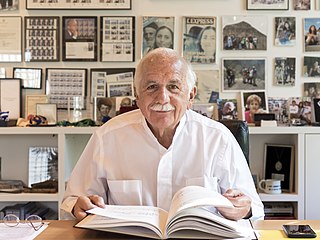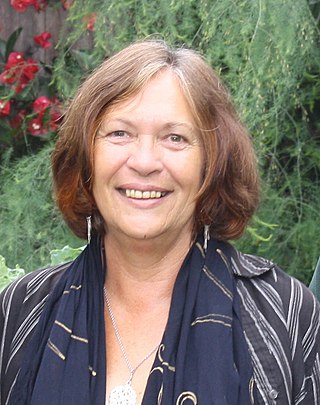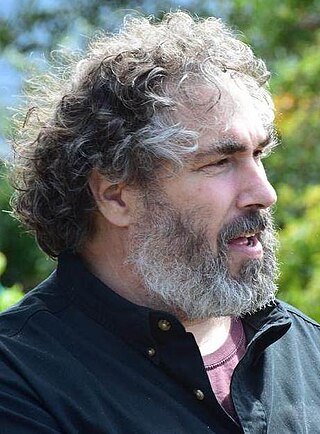
Mariculture or marine farming is a specialized branch of aquaculture involving the cultivation of marine organisms for food and other animal products, in enclosed sections of the open ocean, fish farms built on littoral waters, or in artificial tanks, ponds or raceways which are filled with seawater. An example of the latter is the farming of marine fish, including finfish and shellfish like prawns, or oysters and seaweed in saltwater ponds. Non-food products produced by mariculture include: fish meal, nutrient agar, jewellery, and cosmetics.

An ecovillage is a traditional or intentional community with the goal of becoming more socially, culturally, economically, and/or ecologically sustainable. An ecovillage strives to produce the least possible negative impact on the natural environment through intentional physical design and resident behavior choices. It is consciously designed through locally owned, participatory processes to regenerate and restore its social and natural environments. Most range from a population of 50 to 250 individuals, although some are smaller, and traditional ecovillages are often much larger. Larger ecovillages often exist as networks of smaller sub-communities. Some ecovillages have grown through like-minded individuals, families, or other small groups—who are not members, at least at the outset—settling on the ecovillage's periphery and participating de facto in the community. There are currently more than 10,000 ecovillages around the world.

Moshe Safdie is an Israeli architect, urban planner, educator, theorist, and author. He is known for incorporating principles of socially responsible design throughout the course of his six-decade career. His projects include cultural, educational, and civic institutions; neighborhoods and public parks; housing; mixed-use urban centers; airports; and master plans for existing communities and entirely new cities in the Americas, the Middle East, and Asia. Safdie is most identified with designing Marina Bay Sands and Jewel Changi Airport, as well as his debut project Habitat 67, which was originally conceived as his thesis at McGill University. He holds legal citizenship in Israel, Canada, and the United States.

Permaculture is an approach to land management and settlement design that adopts arrangements observed in flourishing natural ecosystems. It includes a set of design principles derived using whole-systems thinking. It applies these principles in fields such as regenerative agriculture, town planning, rewilding, and community resilience. The term was coined in 1978 by Bill Mollison and David Holmgren, who formulated the concept in opposition to modern industrialized methods, instead adopting a more traditional or "natural" approach to agriculture.

Bruce Charles "Bill" Mollison was an Australian researcher, author, scientist, teacher and biologist. In 1981, he was awarded the Right Livelihood Award "for developing and promoting the theory and practice of permaculture".

Forest gardening is a low-maintenance, sustainable, plant-based food production and agroforestry system based on woodland ecosystems, incorporating fruit and nut trees, shrubs, herbs, vines and perennial vegetables which have yields directly useful to humans. Making use of companion planting, these can be intermixed to grow in a succession of layers to build a woodland habitat. Forest gardening is a prehistoric method of securing food in tropical areas. In the 1980s, Robert Hart coined the term "forest gardening" after adapting the principles and applying them to temperate climates.

Habitat 67, or simply Habitat, is a housing complex at Cité du Havre, on the Saint Lawrence River, Montreal, Quebec, Canada, designed by Israeli-Canadian architect Moshe Safdie. It originated in his master's thesis at the School of Architecture at McGill University and then an amended version was built for Expo 67, a World's Fair held from April to October 1967. Its address is 2600 Avenue Pierre-Dupuy, next to the Marc-Drouin Quay. Habitat 67 is considered an architectural landmark and a recognized building in Montreal.
David Holmgren is an Australian environmental designer, ecological educator and writer. He is best known as one of the co-originators of the permaculture concept with Bill Mollison.
The Global Ecovillage Network (GEN) is a global association of people and communities (ecovillages) dedicated to living "sustainable plus" lives by restoring the land and adding more to the environment than is taken. Network members share ideas and information, transfer technologies and develop cultural and educational exchanges.

Crystal Waters is an American house and dance music singer and songwriter, best known for her 1990s dance hits "Gypsy Woman", "100% Pure Love", and 2007's "Destination Calabria" with Alex Gaudino. All three of her studio albums produced a Top 40 hit on the Billboard Hot 100. In December 2016, Billboard magazine ranked her as one of the most successful dance artists of all time. Her accolades include six ASCAP Songwriter awards, three American Music Award nominations, an MTV Video Music Award nod, four Billboard Music Awards and twelve No. 1 Billboard Dance Chart hits. Her hit song "Gypsy Woman” has been sampled hundreds of times. Though her music sales have yet to be re-certified, Waters has sold over 7 million records worldwide.

Ekistics is the science of human settlements including regional, city, community planning and dwelling design. Its major incentive was the emergence of increasingly large and complex conurbations, tending even to a worldwide city. The study involves every kind of human settlement, with particular attention to geography, ecology, human psychology, anthropology, culture, politics, and occasionally aesthetics.
The United Nations Human Settlements Programme (UN-Habitat) is the United Nations programme for human settlements and sustainable urban development. It was established in 1977 as an outcome of the first United Nations Conference on Human Settlements and Sustainable Urban Development held in Vancouver, Canada, in 1976. UN-Habitat maintains its headquarters at the United Nations Office at Nairobi, Kenya. It is mandated by the United Nations General Assembly to promote socially and environmentally sustainable towns and cities with the goal of providing adequate shelter for all. It is a member of the United Nations Development Group. The mandate of UN-Habitat derives from the Habitat Agenda, adopted by the United Nations Conference on Human Settlements in Istanbul, Turkey, in 1996. The twin goals of the Habitat Agenda are adequate shelter for all and the development of sustainable human settlements in an urbanizing world.
Plants For A Future (PFAF) is an online not for profit resource for those interested in edible and useful plants, with a focus on temperate regions. Named after the phrase "plans for a future" as wordplay, the organization's emphasis is on perennial plants.

Geoff Lawton is a British-born Australian permaculture consultant, designer, teacher and speaker. Since 1995 he has specialized in permaculture education, design, implementation, system establishment, administration and community development.

Robyn Francis is an Australian permaculture figure founder of Permaculture College Australia.

Crystal Cove State Marine Conservation Area (SMCA) is one of a cluster of four adjoining marine protected areas that extend offshore of Newport Beach in Orange County on California’s south coast. The SMCA covers 3.45 square miles of near shore waters. Crystal Cove protects marine life by limiting the removal of marine wildlife from within its borders, including tide pools. Take of all living marine resources is prohibited except: recreational take of finfish by hook-and-line or by spearfishing, and lobster and sea urchin is allowed. Commercial take of coastal pelagic species by round haul net, spiny lobster by trap, and sea urchin is allowed.
Low-impact development (LID) has been defined as "development which through its low negative environmental impact either enhances or does not significantly diminish environmental quality".

Paul Wheaton is an American permaculture author, master gardener, software engineer, and disciple of the natural agriculturist Sepp Holzer. He is known for writing his book, "Building a Better World in Your Backyard", founding Permies, the largest website devoted to permaculture, as well as for creating and publishing articles, videos, and podcasts on the subject of permaculture.
Living Villages is an organisation in the United Kingdom established in 1993 as part of The Athena Foundation UK and as The Living Village Trust in 1997 by Carole Salmon and Bob Tomlinson. The objectives are to encourage sustainable development through appropriate design and ethical commercial practice. The first project of five environmentally friendly houses called Bells Court in Bishops Castle, Shropshire, UK built in 1997, and the 40 house eco-neighbourhood called The Wintles, also in Bishops Castle, were designed to demonstrate that new housing can be eco-friendly, attractive and beneficial to a local community.

Marine Permaculture is a form of mariculture that reflects the principles of permaculture by recreating seaweed forest habitat and other ecosystems in nearshore and offshore ocean environments. Doing so enables a sustainable long-term harvest of seaweeds and seafood, while regenerating life in the ocean.














